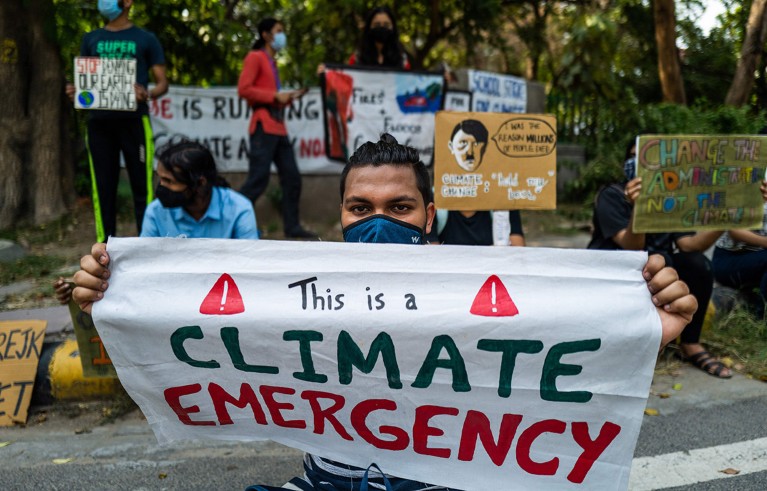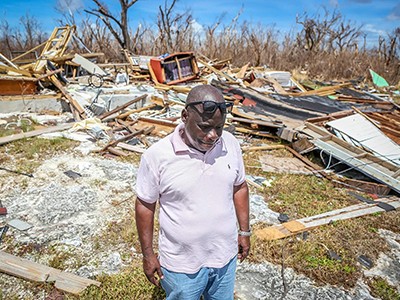
The way you ship local weather messaging issues, by way of altering minds, researchers are discovering.Credit score: Jewel Samad/AFP through Getty
Telling those that scientists nearly unanimously agree that human-caused local weather change is going on can assist to nudge their considering in that route. A examine revealed final month in Nature Human Behaviour1, examined this ‘consensus message’ throughout 27 international locations and located that the individuals least accustomed to the message or who had been sceptical of local weather science had been the almost definitely to vary their perspective when introduced with it.
Local weather-communication researchers who spoke to Nature’s information group say that the findings add to a rising physique of social science figuring out one of the best methods to assist individuals come to grips with the idea that local weather change is actual — however that consensus messaging doesn’t all the time translate to an enduring shift in perspective.
For an everlasting shift, they recommend, the message must be personally related. That’s as a result of “local weather change is affecting the individuals and locations and issues that we love proper now”, says Anthony Leiserowitz, the director of the Yale Program on Local weather Change Communication in New Haven, Connecticut.
Speaking consensus
Many research have discovered that informing individuals of the scientific consensus on local weather change can shift their angle2,3. However most have centered on local weather opinions in the US. Bojana Većkalov, a social psychologist on the College of Amsterdam, and her colleagues needed to see whether or not that messaging works cross-culturally.
False statements about local weather change journey individuals up
They shared an internet survey via social media and e-mail newsletters, after which analysed 10,527 responses from individuals throughout 27 international locations. Respondents estimated the proportion of local weather scientists who they suppose agree that human-caused local weather change exists. They then ranked how assured they had been of their estimates and shared their very own opinions. Afterwards, the researchers confirmed the individuals a number of details, together with that 97% of local weather scientists agree that human-caused local weather change is actual4, after which re-polled them.
The truth that some — together with those that are politically conservative — shifted their views is a “testomony to the common cultural authority of science”, Većkalov says.
David Holmes, a media sociologist and the chief government of the non-profit group Local weather Communications Australia in Melbourne, says that this examine “reconfirmed earlier research” displaying that consensus messaging works, even on a world scale. He needs, nevertheless, that the group may have teased out country-level developments or discerned whether or not numerous cultural attitudes had an affect on the outcomes. The examine additionally didn’t check whether or not the change was lasting.
Private relevance
What’s clear from this examine and others, nevertheless, is that climate-communication methods have turn into extra refined as researchers have learnt what works. Gone are the times of displaying a polar bear clinging to a melting ice sheet to clarify the seriousness of the state of affairs. It’s essential to speak about international warming, “not as a polar bear concern, however as a individuals concern”, Leiserowitz says.
The rise of eco-anxiety: scientists get up to the mental-health toll of local weather change
An rising space of analysis that exhibits promise, researchers say, is how private conversations assist. Begin with issues your viewers cares about, corresponding to meals costs, nationwide safety or fishing, says Matthew Goldberg, a climate-communication researcher at Yale College. “There’s a climate-change angle to nearly the whole lot,” he provides.
Montana Burgess is the manager director at Neighbours United, a non-profit advocacy group in Castlegar, Canada. The group created a climate-conversation toolkit after having success operating a marketing campaign persuading individuals in a rural city in Canada to assist a renewable-energy coverage. Burgess says that one high technique is to “get out of talking-point truth land” by exchanging private tales. As an illustration, as a result of wildfires have worsened in Canada, there are actually “six weeks of the 12 months the place it’s too smoky and scorching to let my child go outdoors, and my child has bronchial asthma”, Burgess says. She remembers solely a handful of smoky days when she was rising up, so she shares that have to assist individuals course of the adjustments they’re seeing.
The following step is to hear rigorously and “join the dots” between an individual’s expertise and native local weather data, Goldberg says.
This technique is predicated on a landmark examine5 wherein canvassers went door-to-door and had ten-minute conversations with voters in Miami, Florida, that had been geared in direction of lowering prejudice in direction of transgender individuals. After sharing their views, voters had been requested to speak a couple of time they confronted judgment for being totally different than others. The conversations elevated assist for a non-discrimination regulation, and social acceptance continued when individuals had been re-surveyed three months later. Utilizing this technique with local weather change particularly remains to be being systematically examined.
Leiserowitz has a private expertise that implies the technique will work. He has a member of the family who used to disclaim local weather change. “It has taken me about 20 years of sluggish, cautious, loving, supportive conversations” to vary their thoughts, he says.



